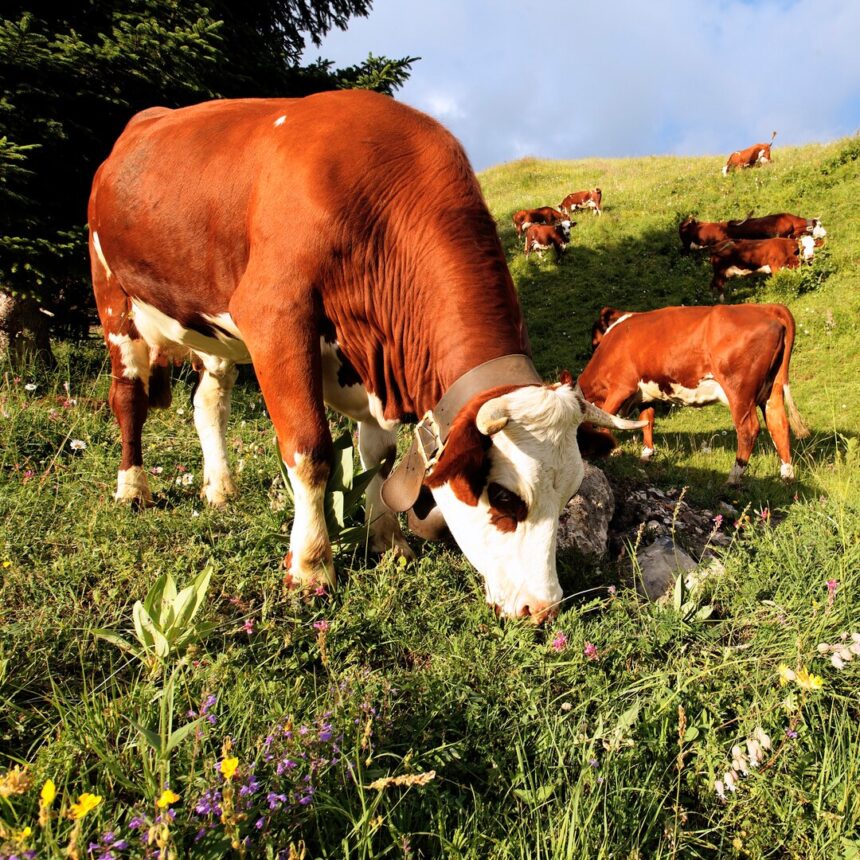Pinzgauer cattle, with their striking appearance and excellent meat and milk production capabilities, have become increasingly popular among farmers in South Africa. Originally from Austria, these dual-purpose cattle have adapted well to various climates and farming conditions in South Africa. If you’re considering breeding and farming Pinzgauer cattle in South Africa, here are ten essential things you should know to ensure success.
- History and Origin:
Pinzgauer cattle originated in the Pinzgau region of Austria and have a rich history dating back several centuries. Bred primarily as dual-purpose cattle for meat and milk production, Pinzgauers are known for their distinctive red and white coloration and robust constitution. - Adaptability to South African Conditions:
Pinzgauer cattle have proven to be highly adaptable to the diverse climatic conditions found in South Africa. Whether in the cooler regions of the Western Cape or the warmer climates of the Free State, Pinzgauers thrive in various environments, making them suitable for farming operations across the country. - Dual-Purpose Capabilities:
One of the key advantages of breeding Pinzgauer cattle is their dual-purpose capabilities. These animals are valued for their high-quality beef production as well as their milk production, making them a versatile option for farmers looking to diversify their operations. - Excellent Meat Quality:
Pinzgauer beef is renowned for its exceptional quality, prized for its tenderness, marbling, and rich flavor. Whether raised for commercial beef production or niche markets, Pinzgauer cattle consistently produce meat of superior quality, meeting the demands of discerning consumers. - Milk Production:
In addition to their meat-producing abilities, Pinzgauer cows are also valued for their milk production. While not as high-yielding as some specialized dairy breeds, Pinzgauer cows produce milk with excellent butterfat and protein content, ideal for cheese and dairy product production. - Grazing and Foraging:
Pinzgauer cattle are well-suited to extensive grazing and foraging systems, making them an economical choice for South African farmers. With their robust constitution and efficient feed conversion, Pinzgauers thrive on natural pastures, reducing the need for supplementary feeding. - Calving Ease:
Pinzgauer cattle are known for their ease of calving, making them an attractive option for both commercial and small-scale farmers. With their moderate frame size and good maternal instincts, Pinzgauer cows typically have few calving problems, resulting in healthy calves and reduced labor inputs. - Temperament:
Pinzgauer cattle are renowned for their docile temperament, making them easy to handle and manage, even for novice farmers. Their calm demeanor and gentle nature make them well-suited to extensive farming systems and contribute to stress-free handling and husbandry practices. - Genetic Purity:
To maintain the integrity and quality of the Pinzgauer breed, it’s essential to source animals from reputable breeders who prioritize genetic purity and breed standards. Working with registered Pinzgauer breed associations and adhering to breeding guidelines ensures the preservation of desirable traits and characteristics. - Market Opportunities:
Breeding and farming Pinzgauer cattle in South Africa present various market opportunities for farmers. Whether selling breeding stock to other farmers, supplying high-quality beef to local markets, or marketing specialty dairy products, Pinzgauer cattle offer diverse revenue streams and opportunities for value-added production.
Breeding and farming Pinzgauer cattle in South Africa offer numerous advantages for farmers seeking a versatile and profitable livestock enterprise. With their adaptability, dual-purpose capabilities, excellent meat and milk production qualities, and docile temperament, Pinzgauer cattle are well-suited to a range of farming systems and environments. By understanding the key aspects of breeding and farming Pinzgauer cattle, farmers can capitalize on the breed’s strengths and maximize their success in the livestock industry.
Join 'Farmers Mag' WhatsApp Channel
Get the latest Farming news and tips delivered straight to your WhatsApp
CLICK HERE TO JOIN






